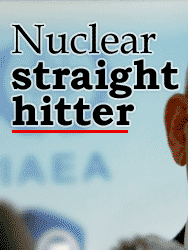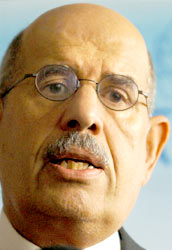|
|
| Help | |
| You are here: Rediff Home » India » News » Special » Encounter |
|
| |||||||||||||||||||||||
|
| |||||||||||||||||||||||


The tricky Vienna weather, known for all the four seasons in one single day, lived up to its reputation on June 5 during my customary round of golf with Mohamed ElBaradei.
We had to dry up in the club twice before we finished the round. But it was as pleasant and productive as the many rounds we played together at the Susanbrunn course in the outskirts of Vienna when I was the Governor for India to the the International Atomic Energy Agency.
The golf course is the only place where he is able to forget the many complex issues that he has to tackle, including the increasing number of country files that are thrown into his lap. His travels and the Vienna weather constantly interfere with his favourite pastime, but he brings to his golf the same seriousness and precision he applies to his work and he manages to hit straight, skirting the many hazards on the way.
This time, our game was a day after he had received an urgent invitation from Washington to brief 'the new team' in the State Department on the work of the IAEA. He was scheduled to leave within the next three days.
The invitation was important as the IAEA Board was scheduled to meet from June 13 to decide, among other things, on a third term for ElBaradei as IAEA chief.
Since he was the only candidate, his re-election should have been a foregone conclusion, but the apparent reluctance of the United States to support him on the ground that no head of Agency should have more than two terms in the future stalled action.
It was an open secret that the US had tried to put up a credible candidate against him, failing which it simply held back its support even after the rest of the Board had indicated support for him. The US had no veto, but no one could think of a Director General for the IAEA without US support.
The announcement in Washington that the US would support ElBaradei, following the meetings of the Secretary of State and others with him, removed the last hurdle in his election and the IAEA Board approved a third term for him on June 13. The approval of the General Conference in September is now a mere formality.
In a way, the US reluctance to support a third term for ElBaradei and its subsequent change of heart point to his infinite success as Director General of the Agency. His impartiality and independence may have irritated the US at times, prompting it to look for an alternative, but the same qualities were considered important for the head of an Agency, which the US values most in the UN system.
The overwhelming support of the rest of the international community, as in the case of ElBardei, has not inhibited the US from ousting UN leaders.
Boutros Boutros Ghali had 14 votes in the Security Council for a second term, but the US veto denied him re-election. The head of the Organisation on the Prohibition of Chemical Weapons, Jose Bustani, was ousted in the middle of his term by the US. The difference in this case was that even the US was convinced that ElBaradei is the right man in the right place at the right time and that he is indispensable.
At his press conference following his election for the third term, ElBaradei explained his style of functioning. He would patiently listen to the member states, he said, and also frankly share his views with them.
"At the end of the day", he said, "I do what I believe to be the objective, impartial, factual way to proceed."
I have witnessed this method of his over and over again during my stint in Vienna.
He is accessible to all the ambassadors, particularly the members of the Board and there is no occasion when he gives the impression that he has a pre-conceived notion about anything. Even when his decisions are not in your favour, you come away with the impression that your input has been fully taken into account. And he gives his decisions without any apology. Fearlessness is as much a part of his personality as impartiality.
The way the Agency has evolved over the years as a nuclear watchdog rather than as a promoter of peaceful uses of nuclear technology has placed it in a collision course with India.
As a non�signatory to the NPT, India should be a thorn in the side of the Director General, whose mission it is to make the NPT universal. India also does not support the comprehensive safeguards that the Agency propagates.
But over the years, Elbaradei has not only learnt to work with India productively, but also has developed personal rapport with our eminent nuclear scientists like Rajagopala Chidambaram and Anil Kakodkar, not to speak of successive ambassadors, who have served as Governors.
India urged to accept IAEA safeguards
ElBaradei is committed to bring India into the mainstream of decision making on nuclear issues rather than exclude it as a maverick. He constantly suggests ways and means in which India can work with the IAEA on peaceful uses within the parameters of our own policy.
After 9/11, when the Agency developed an anti-terrorism strategy, it received India's full support and used facilities in India for training. Many of his suggestions, particularly on safety, have been accepted by us. He relies on Indian scientists in every department of the IAEA, except, of course, safeguards. The number of Indian scientists in the Agency reached an all time high during his term of office.
ElBaradei is an international lawyer and diplomat, heading what is essentially a scientific organization. But during his twenty years or so in the Agency in different capacities, he has mastered not only the politics of nuclear science, but also the science itself. He contributes substantially to every scientific forum at the IAEA and provides political backing to his scientists.
In the Board, he is a guide, guardian and friend to every Governor although he is only a servant of the Board.
He listens to the debate in the Board very attentively and respectfully, but he does not hesitate to step in if he finds a Governor to be unreasonable in his criticism of the Secretariat or its policies.
His favourite image of the Secretariat is that of a swan, sailing smoothly and gracefully, but with its feet splashing feverishly under the water to keep itself afloat. He often reminds the Board that behind the spotless reputation of the Agency is the tireless work of hundreds of men and women, who work in difficult conditions and budgetary constraints.
During difficult negotiations, he helps the Chairman and different groups by giving suggestions borne out of long and intimate experience in the Agency.
ElBaradei has never been criticised for his management style, a rare case in the UN system. Vienna has had its share of wheeler dealers and money manipulators among high UN officials.
In the case of Iraq and Iran, some countries found him "soft", when he should have dragged them over the coals for their nuclear aberrations. But his reports never minced words when it came to instances of non-compliance with their treaty obligations.
He is frank and forthright in his analysis of such failures, but he leaves it to the member states to decide what action they should take against these countries. He fearlessly told the Security Council that he had no evidence to show that Iraq had resumed nuclear weapons activities since the Agency began inspections in Iraq.
War was unjustified: UN inspectors
He repeatedly stated that he had no evidence to show that Iran was engaged in manufacturing nuclear weapons even though some of its failures to comply with their obligations were serious.
He stresses that it is in Iran's own interest to clear the many questions that the Agency has raised. He has not hesitated to point out the contradictions in the reports that Iran has submitted to the Agency. I have seen Iranian diplomats themselves getting agitated over some of his observations.
But those who know his record will never subscribe to the theory that he may have compromised on something or the other to win the US support for his re-election.
Mohamed ElBaradei is made of sterner stuff.
T P Sreenivasan is a former ambassador to the United Nations, Vienna, and former governor for India, International Atomic Energy Agency, Vienna.
Photograph: Joe Klamar/AFP/Getty Images | Image: Rahil Shaikh
Earlier in the series:
Our man in Moscow: D P Dhar
The Fidel Castro I knew
The Charming Diplomat: K P S Menon
India's honoured guest: The Dalai Lama [Images]
The King of Tonga
India in his marrow: Zubin Mehta
A colossus who died alone: Ratu Sir Kamisese Mara
A true friend of India: Steve Solarz
Dixit was short, his presence gigantic
Rao could stick to his guns
www.tpsreenivasan.com
www.asianetglobal.com, (Frankly...Sreenivasan)
The Rediff Specials: Encounter
The Rediff Specials: Encounter
|
|
| © 2008 Rediff.com India Limited. All Rights Reserved. Disclaimer | Feedback |